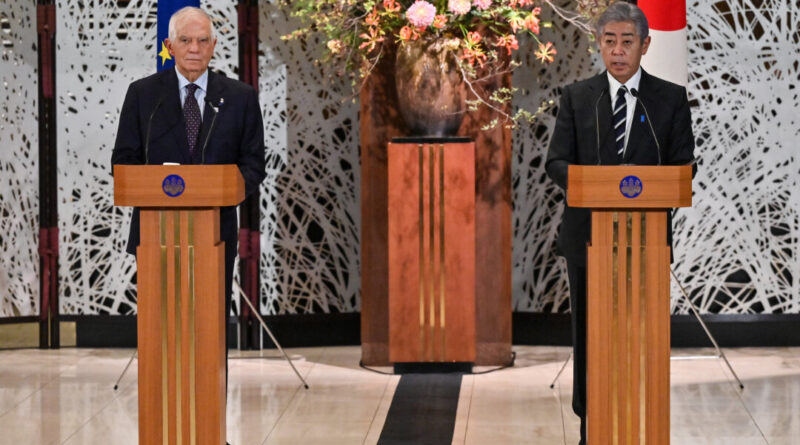Japan and EU unveil comprehensive new security alliance.
Japan and the European Union are initiating a new security partnership in response to escalating aggression from Russia, North Korea, and communist China.
The collaboration will pave the way for enhanced cooperation on various defense and security issues between Japan and the EU.
This groundbreaking partnership marks the first of its kind between the EU and an Indo-Pacific nation, as stated by Japanese Foreign Minister Takeshi Iwaya and EU foreign policy chief Josep Borrell during the announcement on Nov. 1.
“Today marks the beginning of a new phase in our relationship. This chapter is focused not on trade or economics but on security and defense,” remarked Borrell in Tokyo.
The agreement includes provisions for joint efforts on maritime security, space security and defense, cyber issues, foreign disinformation, counter-terrorism, non-proliferation, disarmament, defense industry initiatives, and Japanese involvement in EU missions.
Furthermore, it establishes yearly strategic dialogues at the foreign ministerial level, elevates existing informal discussions to official annual dialogues, and introduces new talks on common areas of interest like threat assessments in the Indo-Pacific.
“Security now encompasses a broader range of interconnected elements, including cyber and hybrid threats, maritime and outer space security, and economic security,” the document details.
The agreement also contemplates the potential for intelligence-sharing, promotes the exchange of defense industry information, and collaborates on nuclear disarmament efforts.
Notably, the comprehensive partnership involves conducting joint military exercises and comes amid escalating tensions with China, North Korea, and Russia.
In recent years, China, North Korea, and Russia have undertaken aggressive actions around Japan as relations with the United States have deteriorated.

Members of the Japan Ground Self-Defense Force (JGSDF) bring down the Japanese national flag in the early evening, on Miyako Island, Okinawa, Japan, on April 20, 2022. Issei Kato/Reuters
This has led EU and Japanese leaders to believe that security in both regions is interlinked, and failing to address Russia’s aggression in Ukraine could embolden Chinese and North Korean aggression in the Indo-Pacific.
Consequently, the leaders expressed “deep concern” about military collaboration between North Korea and Russia, underscoring the need for enhanced strategic partnerships between Europe and the Indo-Pacific to safeguard security in both regions.
“We exist in a precarious world characterized by increasing rivalries, climate crises, and threat of conflicts,” Borrell emphasized. “The best response to these challenges is partnerships among allies.”
Borrell is currently on a tour of East Asia and is set to engage in strategic discussions with South Korea later in the week, highlighting the EU’s active involvement in the region.



